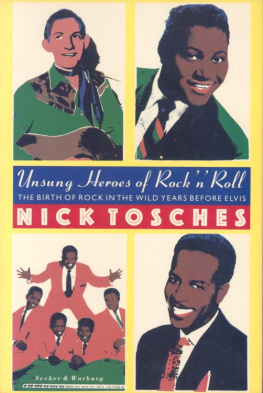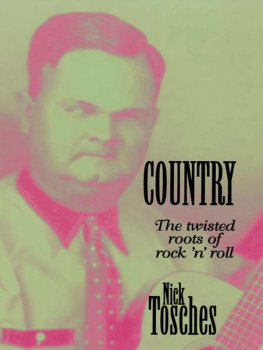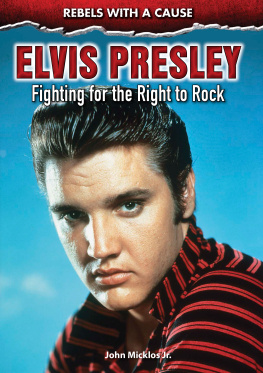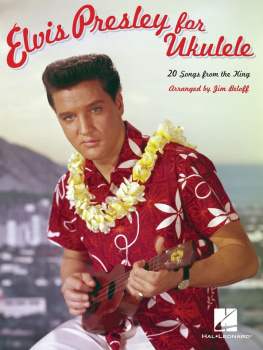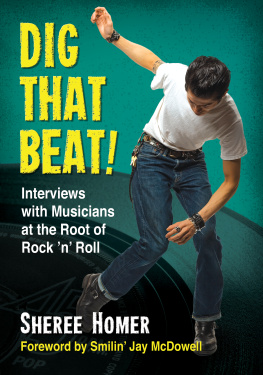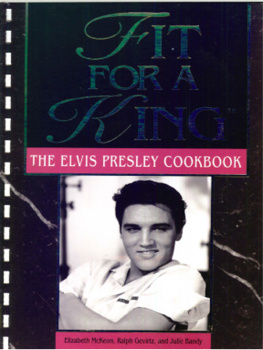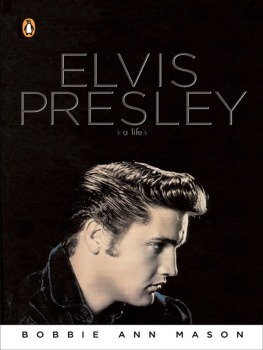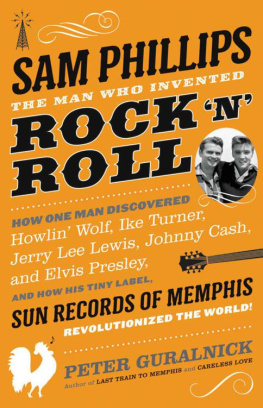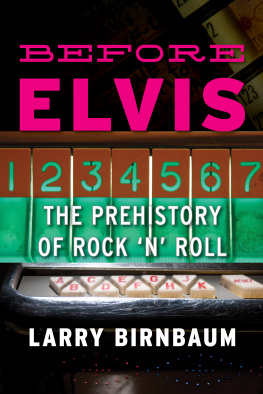Nick Tosches - Unsung Heroes of Rock n Roll
Here you can read online Nick Tosches - Unsung Heroes of Rock n Roll full text of the book (entire story) in english for free. Download pdf and epub, get meaning, cover and reviews about this ebook. year: 1991, publisher: Martin Secker & Warburg Ltd, genre: Non-fiction. Description of the work, (preface) as well as reviews are available. Best literature library LitArk.com created for fans of good reading and offers a wide selection of genres:
Romance novel
Science fiction
Adventure
Detective
Science
History
Home and family
Prose
Art
Politics
Computer
Non-fiction
Religion
Business
Children
Humor
Choose a favorite category and find really read worthwhile books. Enjoy immersion in the world of imagination, feel the emotions of the characters or learn something new for yourself, make an fascinating discovery.
- Book:Unsung Heroes of Rock n Roll
- Author:
- Publisher:Martin Secker & Warburg Ltd
- Genre:
- Year:1991
- Rating:5 / 5
- Favourites:Add to favourites
- Your mark:
- 100
- 1
- 2
- 3
- 4
- 5
Unsung Heroes of Rock n Roll: summary, description and annotation
We offer to read an annotation, description, summary or preface (depends on what the author of the book "Unsung Heroes of Rock n Roll" wrote himself). If you haven't found the necessary information about the book — write in the comments, we will try to find it.
Unsung Heroes of Rock n Roll — read online for free the complete book (whole text) full work
Below is the text of the book, divided by pages. System saving the place of the last page read, allows you to conveniently read the book "Unsung Heroes of Rock n Roll" online for free, without having to search again every time where you left off. Put a bookmark, and you can go to the page where you finished reading at any time.
Font size:
Interval:
Bookmark:
Microsoft@page { margin-bottom: 5.000000pt; margin-top: 5.000000pt; }
For Richard Meltzer
Microsoft@page { margin-bottom: 5.000000pt; margin-top: 5.000000pt; }
Contents
Preface to the Revised Edition
Foreword
Introduction
Jesse Stone
He Who Controls Rhythm
Big Joe Turner
Steak for Breakfast, Gal Meat on a Rainy Day
Nat King Cole
Beyond Pink Cadillacs
Louis Jordan
Hep and the Art of Alto-Sax Repair
Wynonie Harris
The Man Who Shook Down the Devil
Charles Brown
From the School of Cool, Endlessly Drifting
Ella Mae Morse
The Cow-Cow Girl
Cecil Gant
Owl Stew, and All That
Amos Milburn
The Chicken-Shack Factor
Roy Brown
Good Rockin' Tonight
Louis Prima
Gleeby Rhythm Is Born
Ming and Ling
The Chinese Hillbillies
The Treniers
Their God Wore Shades
Stick McGhee
Spo-Dee-O-Dee: How to Get It, How to Use It
Young Bill Haley
The Lounge Act That Transcendeth All Knowing
Roy Hall
See, We Was All Drunk
Hardrock Gunter
The Mysterious Pig-Iron Man
Merrill Moore
The Saddle, Rock & Rhythm Man
Skeets McDonald
Whom in the End the Tattooed Lady Slew
The Clovers
Absalom, Absalom! Doo-Wah, Doo-Wah!
The Dominoes
The Glory of Bubbonia
Jackie Brenston
To the Package Store in Style
The Midnighters
From the Sins of Annie to the Twist
Jimmie Logsdon
The Man Without a Subtitle
Screamin' Jay Hawkins
Horror and the Foot-Shaped Ashtray
Wanda Jackson
Laced by Satan, Unlaced by the Lord
Johnny Ace
Number One with a Bullet
Esau Smith
The Hairy and the Smooth
What That Was
A Chronology of the Coming of Rock 'n' Roll
Archaeologia Rockola
Old Noise, New Plastic
Unsung Heroes on Compact Disc
Microsoft@page { margin-bottom: 5.000000pt; margin-top: 5.000000pt; }
Preface to the Revised Edition
N ow that the 1980s, whatever the fuck they were, are, like the great Liberace himself, dead and gone, can't we get this whole dumb business of rock 'n' roll out of the way for once and for all?
I mean, let's get it straight, Rock 'n' roll is dead. Deader than the eighties. Deader than Liberace. Deader than the papal penis. Dead. Bill Haley, the first white rock-'n'-roll star, came, turned to shit, and went all in one fell swoop, by the summer of 1954. In other words, the cycle was already complete, the beast of rock 'n' roll had been tamed for the circus of the masses, by the time Elvis (another dead fuck) came along. Elvis played out the cycle again, in the span of six months: In "Milkcow Blues Boogie," his third record, made in December 1954, raw power has already turned to schmaltz. You can hear it in that well-rehearsed false start, followed by that voice foreshadowing bad beatnik movies to come: "Hold it, fellas. That don't move. Let's get real, real gone." He didn't have far to go from there to "Bossa Nova Baby" (1963), after which came the Beatles, or the beginning of rock 'n' roll as culture, replete with a fucking limey accent - culture , which neither "From a Buick 6" in the summer of 1965 nor anything since could save us. Even the idea of rock 'n' roll being dead was old by then. The Maddox Brothers and Rose had recorded "The Death of Rock & Roll" in 1956.
I mean, here we are in the 1990s, whatever the fuck they are, and this rock-'n'-roll culture shit is still with us. Take a good look at the bald spot on Paul Shaffer's head. That's what rock 'n' roll is today: a fucking bar-mitzvah band led by some fucking asshole baldy. (Look under Dion's hat, you'll fin d something almost as bad: religion.) It's Muzak on the elevator to middle age. What are the Eurythmics but the Steve and Eydie of our own dismal descent into the blandness of middle age? Is there any difference between Bruce Springsteen's "Born in the U.S.A." and Chrysler's "The Pride Is Back / Born in America" advertising campaign? Is that what rock 'n' roll in its death has become, a fucking car commercial? Can anything used to sell beer be alive? Why doesn't that bald fool get his ass down to Carl Perkins's Apollo Hair Systems in Memphis? Better yet, why doesn't he do himself in? Liberace dies and he lives. I don't get it.
I mean, I tried to like rap music. It sounded incendiary from a distance. Maybe it was creating strife between the races, something like that. Then I listened to it. I've heard more incendiary lines on "Leave i t to Beaver." But, after all, could anything called "black music" be any less bland or superficial than - hey, let's get real, real gone - "white music." Public Image? Guns N' Roses? 2 Live Crew? It's a pitiful day when the only people so-called rock 'n' roll can offend are Tipper Gore and the fucking ADL.
I mean, I've seen Pete Townsend as an after-dinner speaker at the Waldorf . Don't get me wrong; he was good. A regular Sir Cedric Hardwicke or some such shit. But hey - "I hope I die before I get old"? Sure, that was a quarter of a century ago; but, still, he ought to be pushing up daisies by now. And who are the Rolling Stones kidding? Even Lawrence Welk knew when to turn off the bubble machine and call it quits.
We live in an age in which our Caesars no longer write their own speeches, but instead, like hollow actors, enunciate platitudes written for them, like so much vapid advertising copy. It has been so long since they have elucidated their own honest thoughts that honest thought itself is instinctively shunned as taboo, as something that might alienate the consumer. Much of the writing in magazines - not only about rock 'n' roll, but about everything - has taken on that same deadening quality, as if writers were ghostwriting their own thoughts to conform to some norm of taste. " Time cries and lets you care." Fuck that shit. "We Are the World" was not rock 'n' roll. It was the sound of Time crying. Maybe real rock 'n' roll is impossible in an age of s afe sex, an age in which the youth of America seem more d ri ven by venality than by venery, an age in which yellow suspenders are regarded as a sign of power rather than of putzhood.
But what the hell. We are here to praise rock 'n' roll, not to linger at its grave. If we can live without Liberace, we can live without rock 'n' roll as well.
This book began as a series of articles for a magazine called Creem in 1979. Creem was one of those magazines, which no longer exist, for which one could write pretty m uch as one pleased, relatively free of the editorial restra in ts des i gned to b e sure that neither advertisers no r readers be offended by a poli tically incorrect sentiment, a scurrilous word, or, God for b id, a sense of humor. I began the series, which bore the same t i tle as this book, with the piece on Wynonie Harris. I wanted to celebrate rock 'n' roll and glorify those who had been forgotten; to show that there was no new thing under the sun and that what had come before often far surpassed in brilliance the excesses and pretensions of its pale and errant progeny. Four y e ars later, in cahoots with Michael Pietsch, who was then an ed i tor at Sc ri bner's, I expanded the series into a book, which came out in the summer of 1984. Since then, it's been nice to see, there has been renewed interest in many of the characters I wrote about; and much of the music at the heart of this book has been reissued on compact discs, often plugging the book as a source.
People have told me how much this book m akes t hem laugh. It surely isn't a serious book; it didn't come in to be in g a s s uch. I wrote it as it came to me, not really caring, w i th the mus i c i tself behind me for inspiration (along with the Internal Revenue Service, I clearly remember). I wanted the book to encompass all the historical facts and arcane data that I had been collect in g about the dawn of rock 'n' roll; I wanted to bring all that together in one place. At the same time, I wanted to have fun. That this fun - what else can you call it, even in a book? - has been passed along to readers is the sort of reward that occasionally makes all this typing worth it. If the book leads as well to further and wider rediscovery of the music itself, so much the better. In any event, while a slew of factual amendments have been made for this new edition, I messed not at all with its dirty little soul. New unsung heroes have been added, along with a listing of compact-disc reissues; but nothing new in spirit.
Next pageFont size:
Interval:
Bookmark:
Similar books «Unsung Heroes of Rock n Roll»
Look at similar books to Unsung Heroes of Rock n Roll. We have selected literature similar in name and meaning in the hope of providing readers with more options to find new, interesting, not yet read works.
Discussion, reviews of the book Unsung Heroes of Rock n Roll and just readers' own opinions. Leave your comments, write what you think about the work, its meaning or the main characters. Specify what exactly you liked and what you didn't like, and why you think so.

